|
JEAN FOUQUET - CAPTURE OF JERUSALEM BY
PTOLMENY I SOTER
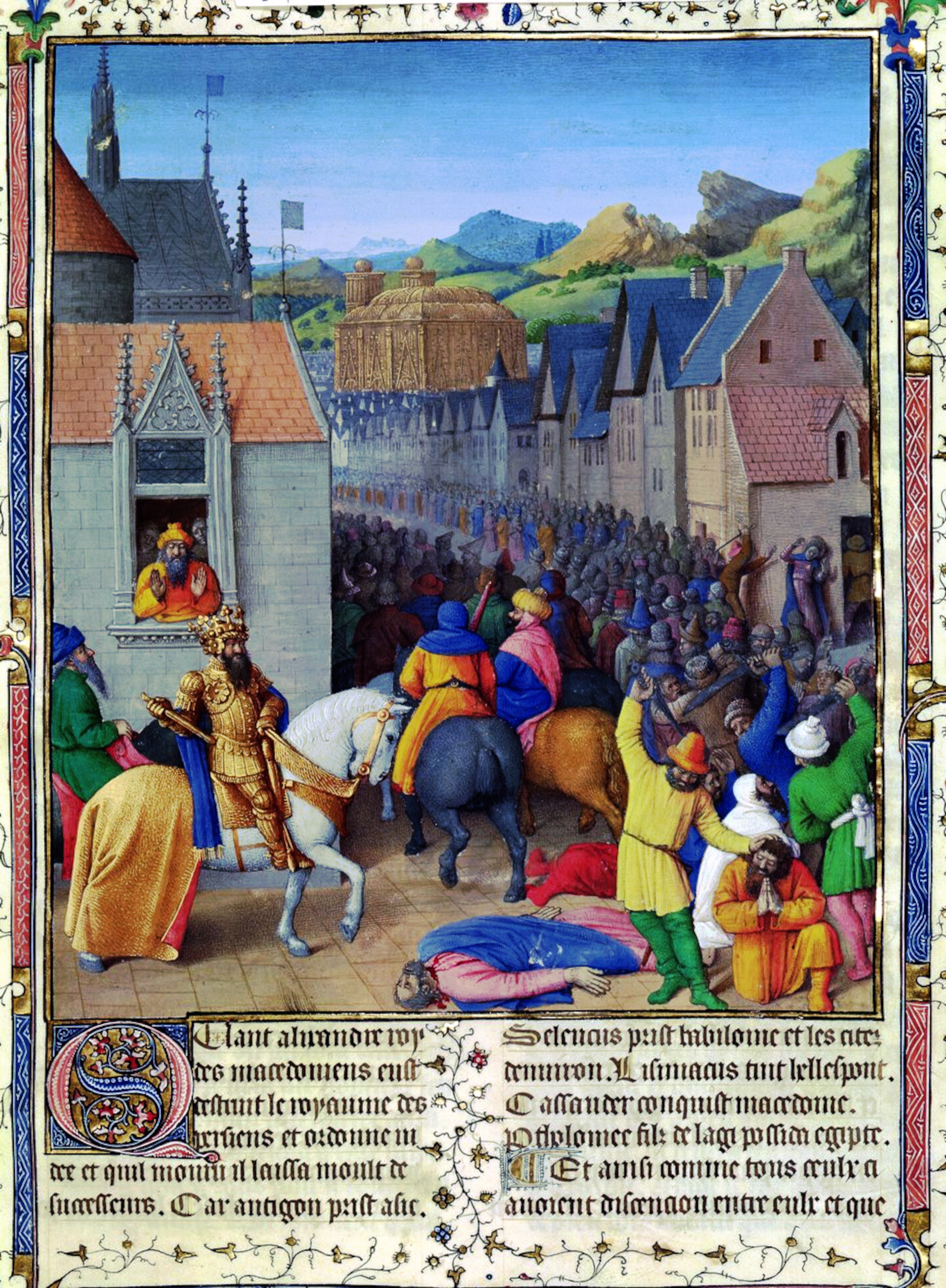
Jean Fouquet, Public domain, via Wikimedia Commons
1470
|
- Called the Capture of Jerusalem by Ptolemy I Soter
by Jean Fouquet in the 15th-century.
- Illuminated text illustration from Antiquites Judaiques
which is the French translation of Flavius Josephus's Antiquities of the Jews.
- Northern Renaissance style.
- Ink with natural dyes on parchment.
Antiquities of the Jews is a 20-volume work of Greek-language historiography written in the 1st century CE
by Flavius Josephus. The book details Jewish history from the creation of the world to the outbreak of the First Jewish-Roman War in 66 CE, aiming to present Judaism to a Hellenistic audience and provide a credible history for the Jewish people. (Assistant)
|

Macedonia under
Philip II |
- King Philip II (382 BC-336 BC) of Macedon was the
ruler of the ancient kingdom of Macedonia from 359 BC until his death in 336 BC.
- He was a member of the Argead dynasty, founders of the ancient kingdom, and the father of Alexander the Great.
- During his reign the conquest and political consolidation of
most of Classical Greece took place.
- He achieved this by
reformation of the army and the establishment of the
Macedonian phalanx, which were foot soldiers in strict
formation, and his extensive use of siege engines,
diplomacy and marriage alliances.
Philip's military reforms were a new approach to
the current hoplite warfare which focused on their
shield, the aspis; his focus was on a new weapon, the
sarissa. The first phalanx was a 10-by-10 square with
very few experienced troops. The phalanx was later
changed to a 16-by-16 formation, Philip called the
soldiers in the phalanx pezhetairoi, meaning
'foot-companions', bolstering the importance of the
phalanx to the King. (Assistant)
|

Kingdom |
- The kings of Macedon practiced polygamy and Philip II had
7 wives throughout his life, all members of royalty from foreign dynasties.
- All his wives were considered queens, making their children
royalty as well.
- His fourth wife, Olympias of Epirus, daughter of Neoptolemus I,
was the mother of Alexander the Great and Cleopatra.
- Philip was assassinated by the captain of his bodyguards, Pausanias, who, according to Diodorus, was also his lover.
- His son Alexander the Great was proclaimed king on the spot
by the nobles.

Alexander the Great
empire |
-
Alexander the Great (356 BC-323 BC) was also known as
Alexander III, King of Macedon.
- He succeeded his father Philip II to the throne in 336 BC at the age of 20 and spent most of his ruling years conducting a lengthy military campaign throughout Western Asia, Central Asia, parts of South Asia, and Egypt.

Alexander was
erudite |
- Well educated, Alexander had been tutored by Aristotle until he was age 16
and was an accomplished philosopher.
- Alexander led several battles after his assumption of the
kingship of Macedon in 335 BC.
- He was able to use his new
found authority to launch the pan-Hellenic project envisioned
by his father, which was to assume leadership over all Greeks
in their conquest of Persia.
By the age of 30, he had created one of the
largest empires in history, stretching from Greece to
northwestern India. He was undefeated in battle and is widely considered to be one of history's greatest and most successful military commanders. (Wikipedia)
|

Egyptian tents |
- In 332 BC, Alexander the Great, conquered Egypt, which at the time was a satrapy of the Achaemenid Empire later called Egypt's
31st Dynasty.
- He visited Memphis, and traveled to the oracle of Amun at the Siwa Oasis
where the oracle declared him to be the son of Amun.
- Amun, or Amon, was a supreme god in ancient Egyptian mythology, especially prominent during the New Kingdom, and was revered as the
'King of the Gods.'
- In 305 BC, Ptolemy took the title of Pharaoh, taking the Egyptian name Meryamun Setepenre, which means
'Beloved of Amun' (Amun means God) Chosen of Ra (Ra means God).
- He's often criticized for choosing this title, but it was
the title of all his predecessors, however, the Jews didn't
feel he should be called that.
Satraps were the governors of the satrapies (provinces) of the ancient Achaemenid Empire. (livius.org)
|

Legendary |
- Alexander became legendary as a classical hero and was featured prominently in the historical and mythical traditions of both Greek and non-Greek cultures.
- His military tactics remain a significant subject of study in military academies worldwide.
- Additionally, several legends surround his birth and
childhood and ancient Greek biographer Plutarch claimed that
his mother, Olympias, was struck by a thunderbolt on the eve
of his birth.
- This caused a flame to spread 'far and wide' and
it was hinted that Zeus was his father.
Legends of Alexander's exploits coalesced into
the third-century Alexander Romance which, in the
premodern period, went through over one hundred
recensions, translations, and derivations and was
translated into almost every European vernacular and
every language of the Islamic world. After the Bible,
it was the most popular form of European literature. (Wikipedia)
|

Achaemenid Empire |
- Alexander treated the Egyptians with respect and their religion
as well, however, he appointed Macedonians to virtually all the senior posts in the country.
- He founded a new Greek city he named Alexandria to be the new capital.
- The wealth of Egypt could now be harnessed for Alexander's conquest of the rest of the Achaemenid Empire.
- Early in 331 BC he led his forces away to Phoenicia
and left Cleomenes of Naucratis as the ruling nomarch to control Egypt in his absence,
however, Alexander would never return to Egypt.
The Achaemenid Empire, founded by Cyrus the Great in 550 BCE and known as the First Persian Empire, was the largest ancient empire, stretching from Anatolia to India and ruling over 44% of the world's population before falling to Alexander the Great in the 4th century BCE. The empire was characterized by its global reach, centralized administration, and multi-cultural synthesis, which blended elements from various regions, including Mesopotamia, Egypt, and the Indus Valley. (Wikipedia)
|

Poisoned |
- Alexander died in the palace of Nebuchadnezzar II, in Babylon, at age 32
on June 11, 323 BC.
- Both Diodorus and Plutarch provided
different accounts of his death, both having to do with
poisoning after drinking wine.
- Given the propensity of the Macedonian aristocracy to assassination and Alexander's relatively young age, foul play
is featured in multiple accounts of his death.

Macedonian Empire |
- Alexander
conquered most of the known world in 332 BC and built
one of
the largest kingdoms that has ever existed in the world.
-
This
included Persia, Turkey, Greek Macedonia, Egypt, Libya,
Eithiopia, and extending through Pakistan almost to China and
into Russia.
- There wasn't any other world that they knew
about and he conquered it all.
Alexander the Great created the Macedonian Empire, also known as the Alexander the Great Empire, a vast kingdom that stretched from Greece across Asia to India. He also founded numerous cities, most notably the city of Alexandria in Egypt, which became a vital hub for Mediterranean trade. (Assistant)
|

Kingdom divides |
- When the young king died he didn’t leave any heirs to the throne.
- This is because his only child and his queen, Roxanne, were slain by one of his generals.
-
Alexander was able to keep his
vast kingdom together because not only was he a great general,
but also because people loved him.
- At the time of his
death, his four generals divided the territories four
different ways.

General
Perdiccas |
- Perdiccas (355 BC-320 BC), who was regent, appointed Ptolemy, one of the generals
and one
of Alexander's most trusted companions and military officers.
- General Ptolemy was
able to consolidate his control over Judea and Egypt.
- The other three generals also took charge; one claimed Macedon,
another went east, and the third took over the Babylonian
area.
Perdiccas was a Macedonian
general, successor of Alexander the Great, and the
regent of Alexander's empire after his death. When
Alexander was dying, he entrusted his signet ring to
Perdiccas. Initially the most pre-eminent of the
successors, Perdiccas effectively ruled Alexander's
increasingly unstable empire from Babylon for three years until his assassination, as the kings he ruled for were incapable. (Wikipedia)
|
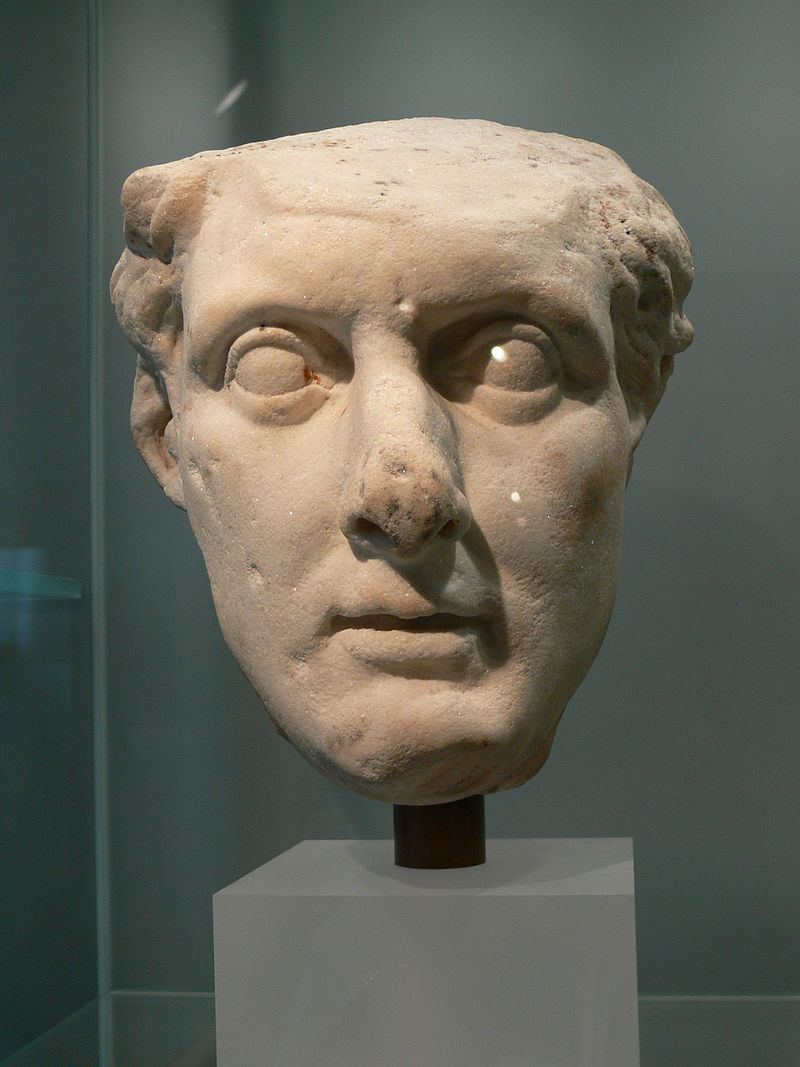
Wolfgang Sauber, CC BY-SA 3.0 , via Wikimedia Commons
Portrait bust of Ptolemy I |
- On the death of Alexander, Ptolemy I Soter (369
BC-282 BC) seized the satrapy of Egypt as his share
and stirred the long hostilities between Egypt and Syria,
which he invaded several times.
-
Through what was called the Partition of Babylon, Ptolemy Lagi,
as he was nicknamed, and a lower ranking general
called Seleucus gained control and at first they both ruled
jointly.
- However, it was Ptolemy's allocated lands that
were politically assigned to him and Seleucus was technically serving him, but Seleucus wanted land of his own.
As a prominent general, he was assigned Egypt as his satrapy and secured its control by eliminating rivals to his rule, such as Perdiccas and Antigonus. He acquired Judea and other territories like Cyrenaica and Cyprus as part of the post-Alexandrian power struggles, particularly after securing Coele-Syria (which included Judea) through military action and strategic alliances during the wars against Antigonus. (Wikipedia)
|
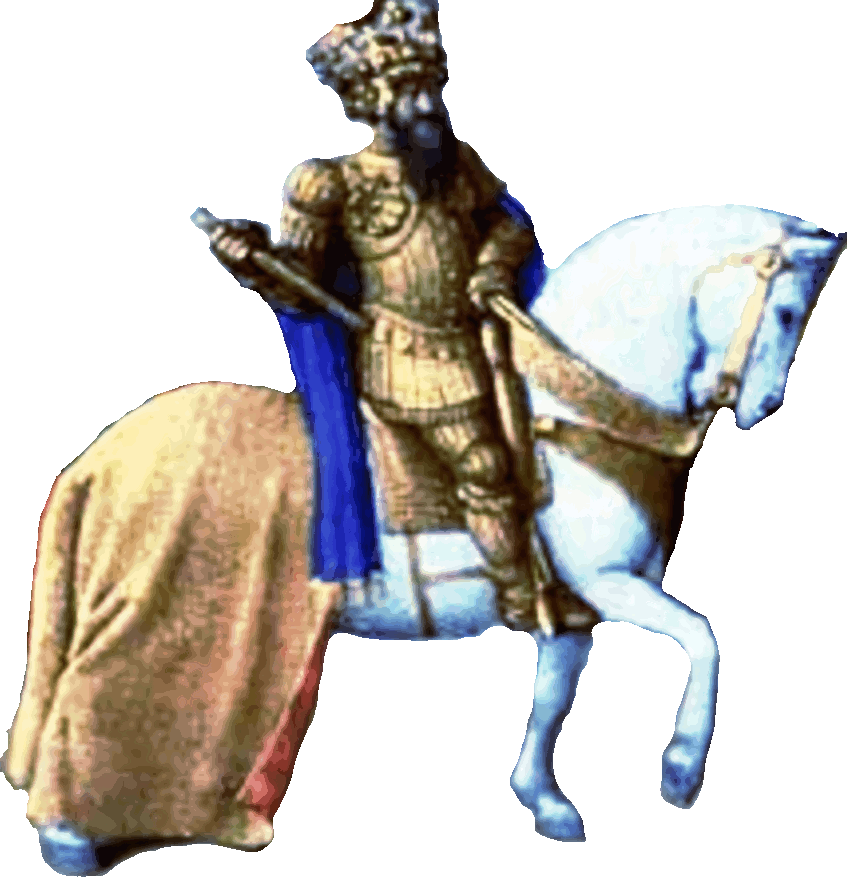
Ptolemy the Savior |
- Ptolemy I Soter was king and pharaoh of Ptolemaic Egypt from 305 BC to
his death in 282 BC.
- Ptolemy was the son of Lagus and Arsinoe
and was a civil servant of Philip II of Macedon.
- His
father was a Macedonian Greek royal house which ruled the
Ptolemaic Kingdom in Egypt during the Hellenistic period.
-
He finally gained complete control over the Judeans by 320 BC
in both Egypt and Judea through his participation in the Wars
of the Diadochi.
- After his
death, his descendants continued to rule Egypt until 30 BC in
a dynasty that spanned 275 years.

St. Nicolas is
Hellenistic |
- St. Nicholas, Nikolaos, is the patron saint of Greece, where his primary role is as the protector of sailors and seamen.
- He was a Greek Orthodox Christian bishop from Myra in Lycia (Asia Minor) in the 4th-century
AD, a period influenced by Hellenistic culture
-
Hellenistic St. Nicholas iconography often depicts him with his mitre and crozier, symbolizing his role as a spiritual shepherd.
In classical antiquity, the Hellenistic period covers the time in Greek and Mediterranean history after Classical Greece, between the death of Alexander the Great in 323 BC and the death of Cleopatra VII in 30 BC, which was followed by the ascendancy of the Roman Empire, as signified by the Battle of Actium in 31 BC. (Assistant)
|
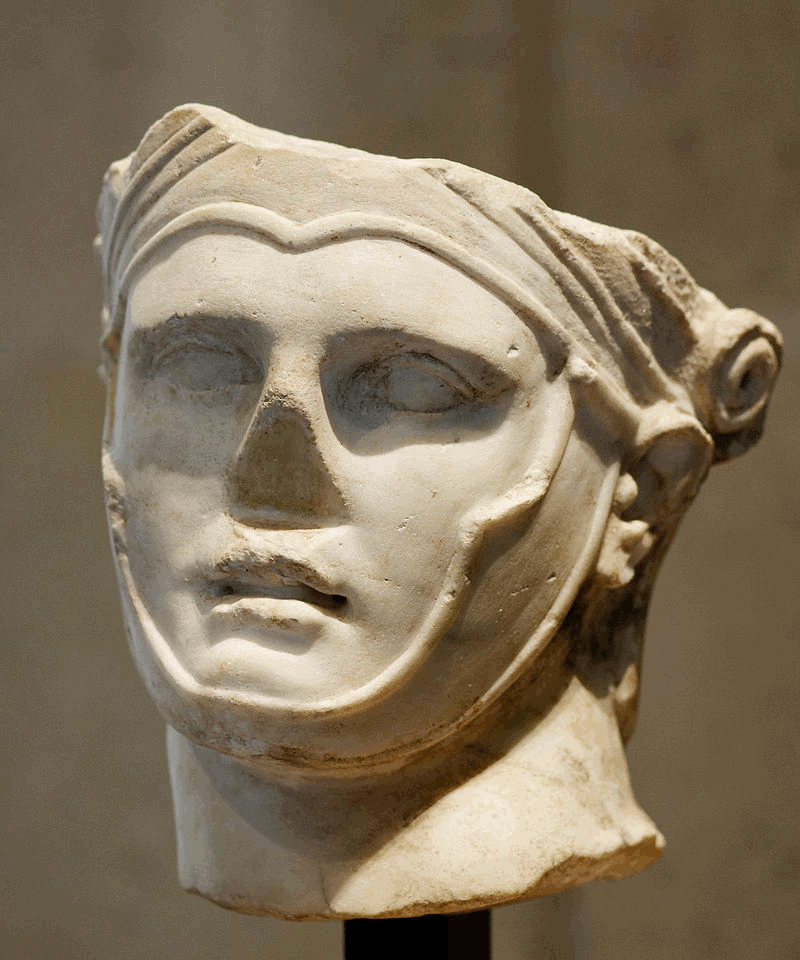
Louvre Museum, CC BY 2.5 , via Wikimedia Commons
Seleucus |
- Eventually, Seleucus I Nicator (358 BC-281 BC) and Ptolemy
I Soter went to war against each other leading to the formation of two empires,
the Seleucid and Ptolemaic dynasties.
- Seleucus rose to become the absolute ruler of Asia Minor, Syria, Mesopotamia, and the Iranian plateau, assuming the title of
Basileus
or king.
- The Seleucid Empire was one of the major powers of the Hellenistic world, until it was overcome by the Roman Republic and Parthian Empire
by the late
1st-century BC.
Seleucus I Nicator was a Macedonian Greek general, officer and successor of Alexander the Great who went on to found the eponymous Seleucid Empire, led by the Seleucid dynasty. Initially a secondary player in the power struggles following Alexander's death. (Wikipedia)
|
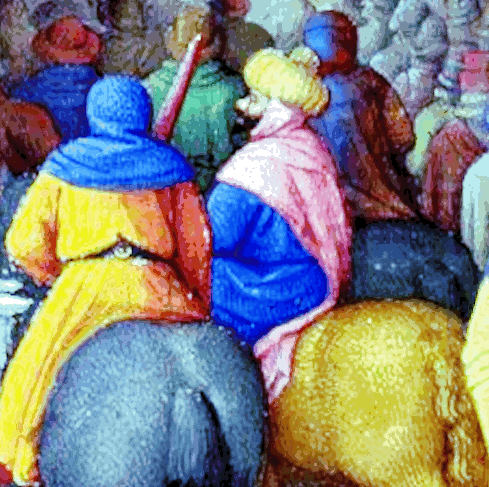
Power struggles |
- Syria passed to Seleucus, after what they regarded as Ptolemy’s desertion.
- For the next
100 years, the question of the ownership of southern Syria (Judea) produced recurring warfare between the Seleucid and Ptolemaic dynasties.
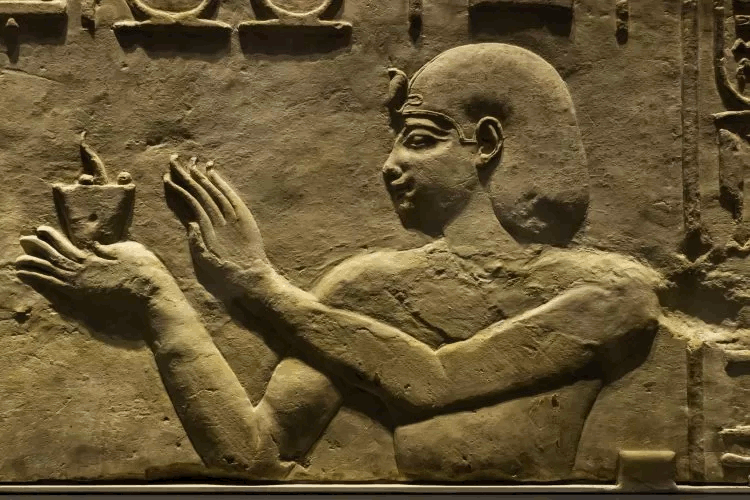
The Getty Center in Los Angeles, California
Relief of Ptolemy I Making an Offering to Hathor |
- The Hathor temple in Dendera, Egypt, and its connection to the Ptolemaic Dynasty
is the Dendera temple complex, including the current Temple of Hathor.
- Construction began in 54 BC under Ptolemy II Auletes and was completed by Roman emperors.
- The temple, dedicated to the goddess Hathor, showcases numerous Ptolemaic and Roman period decorations and structures.
-
This is a limestone carving dating to the Ptolemaic period which depicts the founder of the Ptolemaic Dynasty presenting religious items to the goddess Hathor.
- Hathor is identified by her cow-horned headdress and vulture cap
with sun disk, holding a papyrus scepter.
Hathor was a major goddess in ancient Egyptian religion who played a wide variety of roles. As a sky deity, she was the mother or consort of the sky god Horus and the sun god Ra, both of whom were connected with kingship, and thus she was the symbolic mother of their earthly representatives, the pharaohs. (Wikipedia)
|

Biblical pharaohs |
-
The Ptolemaic Kingdom was an ancient Greek polity based in
Egypt during the Hellenistic period.
- These are the pharaohs in the Bible, Abraham, Issac
and Jacob.
- It was founded in 305 BC by the Macedonian Greek general Ptolemy I Soter, a
general of Alexander the Great, and ruled by the Ptolemaic dynasty until the death of Cleopatra VII in 30 BC.
- From the beginning, Ptolemaic Egypt was the wealthiest and
most powerful of Alexander's successor states, and the leading
example of Greek civilization.
- However, by mid 2nd-century BC, dynastic strife and a series of foreign wars weakened the kingdom, and it became increasingly reliant on the Roman Republic.
Julius Caesar and Augustus supported laws that allowed Jews protection to worship as they chose. Synagogues were classified as colleges to get around Roman laws banning secret societies and the temples were allowed to collect the yearly tax paid by all Jewish men for temple maintenance. (Assistant)
|

Female rulers |
-
All the male rulers of the dynasty took the name Ptolemy, while princesses and female rulers preferred the names Cleopatra, Arsinoë and Berenice.
- The Greek Ptolemies also adopted the Egyptian custom of marrying their sisters, with many of their line ruling jointly with their spouses, who were also of the royal house.
- Which did eventually begin to cause genetic problems.
- There were several Cleopatra's, however the most famous
was the
charismatic queen of Egypt; mistress of Julius Caesar and later of Mark Antony;
who some believe killed herself to avoid capture by Augustus Octavian (69-30 BC),
nephew of Julius Caesar.
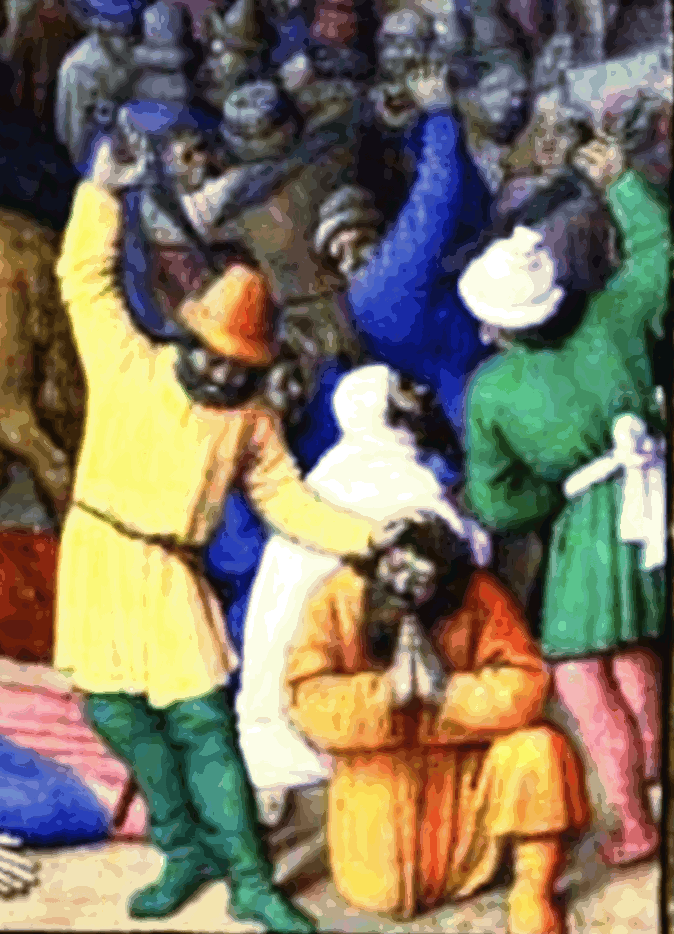
Capturing Jerusalem |
-
A Jewish community was already present in Egypt when Ptolemy I Soter took control of the region in 323 BC, and a significant diaspora continued to grow under Ptolemaic rule.
- He captured Jerusalem around 312 BC by employing a deceptive tactic of entering the city on the Sabbath, when the Jewish population was observing rest.
- Ptolemy subsequently transported many captives to Egypt, settling them there, and ruled the city with a firm hand.
- Most reports say that he was kind to the Jews, but there
is a dead Jew in the drawing.

Egyptian army |
- Ptolomy I Soter found it necessary from the outset, however, to
pursue a conciliatory policy toward the Egyptians, since
Egyptians had to be recruited for his army, which initially
numbered only 4,000 men.
- This was really the immigration
of a second wave of Jews into Egypt.
- Some Jews joined Alexander's armies as mercenaries and were rewarded with land grants in the new cities he founded, further spreading the Jewish population across the empire.

Isle of Rhodes |
-
In 304 BC Ptolemy aided the inhabitants of Rhodes against Antigonus
I Monophthalmus and was
given the divine title Soter (Savior), which he was commonly called from that time.
- This occurred after Antigonus, the One-Eyed, was killed at the Battle of Ipsus,
this allowed Ptolemy to seize control of the region of Coele-Syria, including Jerusalem.
Antigonus I Monophthalmus (382 BC – 301 BC) was a Macedonian Greek general and successor of Alexander the Great. A prominent military leader in Alexander's army, he went on to control large parts of Alexander's former empire. He assumed the title of basileus (king) in 306 BC and reigned until his death. He was the founder of the Antigonid dynasty, which ruled over Macedonia until its conquest by the Roman Republic in 168 BC.
(Wikipedia)
|

Warlike |
-
After Ptolemy I Soter gained control of Jerusalem around 301 BC,
he ruled the region as part of the Ptolemaic Kingdom of Egypt until 198 BC.
- He initiated a period of increased Hellenistic cultural and
goverenmental influence.
- His rule was marked by the establishment of Greek administrative systems and the transportation of Jewish inhabitants to Egypt, who were treated as freemen.
-
With the Hellenistic influence came the implementation of a Greek bureaucratic and taxation system, and the establishment of Greek military colonies.

Alexandria |
- Ptolemy I also captured and resettled a segment of the Jewish population in Egypt, which led to the growth of the Jewish community in Alexandria
which was founded in 331 BC by Alexander the Great.
- There
was already a Jewish population in Egypt when Alexander
arrived.
Alexander the Great did not displace the Jewish population from their homeland. When Alexander conquered the Persian Empire and took control of Judea in 332 BCE, the Jewish people were already living in the region, which was once known as Canaan.
(Assistant)
|

Cultural center |
- During his rule, Egypt became a thriving bastion of Hellenistic civilization and Alexandria a great seat of Greek culture.
- The city soon surpassed Athens as the cultural center of the Hellenic world.
- Instead of moving the Jewish population, Alexander
maintained or even expanded upon the religious and political
privileges they had enjoyed under Persian rule.
- An inscription recording a Jewish dedication of a synagogue to Ptolemy III and Berenice was discovered in the 19th-century near Alexandria.
Jewish tradition records that he was impressed by the high priest in Jerusalem and, as a result, granted the Jews considerable autonomy. This included the right to live by their ancient laws and exemptions from taxes during the Sabbatical year. Jewish communities during Alexander's time.
(Assistant)
|

Egytian influence
|
- The early Ptolemies did not disturb the religion or the
customs of the Egyptians.
- They built magnificent new temples for the Egyptian gods and soon adopted the outward display of the pharaohs of old.
- Ptolemy I Soter respected the Egyptian people and recognized the importance of their religion and traditions.
- The Egyptians were allowed to build a fortress at Herakleopolis and another one in Leontopolis next to a Jewish temple.
Ptolemy won over the Egyptians through the establishment in Memphis of the Serapis cult, which fused the Egyptian and Greek religions; through restoration of the temples of the pharaohs, which had been destroyed by the Persians; and through gifts to the ancient Egyptian gods and patronage of the Egyptian nobility and priesthood.
(Wikipedia)
|

Library at
Alexandria |
- Ptolemy I founded the Museum (Mouseion), a common workplace for scholars and artists, and established the famous library at Alexandria.
- Besides being a patron of the arts and sciences, he was a writer himself.
= In the last few years of his life Ptolemy wrote a generally reliable history of Alexander’s campaigns
although it is now lost, however, it was used extensively by the historian Arrian.

Towering |
- The Lighthouse of Alexandria, sometimes called the Pharos of
Alexandria, was begun during the reign of
Ptolemy I in 305 BC, and completed by his son, Ptolemy II Philadelphus (280–247
BC).
- It was lit by a flame and they used technology that
allowed it to be seen from 200 to 300 miles away.
- They
turned it into a huge shipping port and ships would come from
all over just to see the light.
- It was reminescent of the
Statue of Liberty's torch and this liberty is still
progressing forward.
It has been estimated to have been at least 100 metres (330 ft) in overall height. One of the Seven Wonders of the Ancient World, for many centuries it was one of the tallest man-made structures in the world.
(Wikipedia)
|

War horse
|
- Ptolemy I deemed Ptolemaic Egypt independent and proclaimed himself Basileus and Pharaoh in 305 BC.
- In 306 BC, Ptolemy was defeated in the great naval fight off Salamis in Cyprus which was lost to Egypt.
- During the last 15 years of his reign, because of the defeats he suffered between 308
BC and 306 BC, Ptolemy preferred to secure and expand his empire through a policy of alliances and marriages rather than through warfare.
- Ptolemy I Soter died in 283 BC at the age of 84.

Ptolemaic king
|
- After his death, his son Ptolemy II Philadelphus freed the Jewish captives in Alexandria
amd facilitated one of the most important works for common use, the
Greek Septuagint.
- Keep in mind, this is the
period when the Jews were switching from polytheism to
monotheism (one god) so they were rewriting (retranslating) everything
between 600 BC and 400 BC (approximately).
- The Ptolemaic
era began in 320 BC, some short 80 years later, if not sooner,
however, not a long time.
- The insinuation by historians that the Greek version came
from their 'ancient' text is questionable, at the least,
because they had nothing ancient that remained in their modern
beliefs and they seemingly modified it 80 years earlier so
that's not ancient.
By the end of the Babylonian captivity, Yahwism
began turning away from polytheism — or, by some
accounts, Yahweh-centric monolatry — and transitioned
towards monotheism, and Yahweh was proclaimed the
creator deity and the sole deity to be worthy of
worship. Following the end of the Babylonian captivity and the subsequent establishment of Yehud Medinata in the 4th century BCE, Yahwism coalesced into what is known as Second Temple Judaism. (Wikipedia)
|

Flora |
- A Gnostic bishop named Ptolemy interpreted Jesus Christ's teachings in his Letter to Flora,
in 2nd-century AD, viewing Jesus as having received a
'pure legislation' from God that replaced the Old Testament's
'inferior' laws.
- The author of the Letter assumed that the Christian Savior was sent, not to destroy the Law, but to complete it
and he quoted apostles Matthew, John and Paul.
- He said that, 'On the other hand, one cannot impute the Law to the injustice of the opposite, God, for it is opposed to injustice. Such persons do not comprehend what was said by the Savior. For a house or city divided against itself cannot stand [Matthew 12:25], declared our Savior.'
The Law was ordained through Moses, my dear sister Flora, has not been understood by many persons, who have accurate knowledge neither of him who ordained it nor of its commandments. I think that this will be perfectly clear to you when you have learned the contradictory opinions about it.
Some say that it is legislation given by God the Father; others, taking the contrary course, maintain stubbornly that it was ordained by the opposite, the Devil who causes destruction, just as they attribute the fashioning of the world to him, saying that he is the Father and maker of this universe. Both are completely in error; they refute each other and neither has reached the truth of the matter. (Ptolemy's Letter to Flora)
|

Semi-autonomous |
-
Under Ptolemaic rule, Judea saw initial deference to Jewish religious practices and laws, allowing for a semi-autonomous status for Jewish communities in Egypt and Judea.
- However, later Ptolemaic rulers, particularly Ptolemy IV Philopater and Ptolemy V Epiphanes, engaged in periods of religious persecution and desecrated the
Temple.
- Jewish identity remained intertwined with their faith and land, facing increasing pressure from Hellenization and tensions with the Ptolemaic state.
- This eventually led to a divided Jewish population, with some embracing Hellenistic culture and others resisting
it.

Warlike kings |
- No major uprising took place in Judea during the
Ptolemaic era, but what is sure, that there were enormous tensions between Jews and Seleucids.
- The involvement in the Jewish religious practices, created a huge gap between the two sides.
- It resulted in the Maccabean revolts in 168 BC, and a Jewish civil war
which led to even more refugees.
-
The Ptolemy’s and the Seleucuns fought against each other over territory, and the Jewish people were caught up in this struggle.
- They wanted the ongoing conflict to end.
- The Jewish people were finally rid of the Ptolemy’s after the Seleucuns took over, but they didn’t fare much better under their rule.

Ptolemaic Jew |
-
Ptolemaic Jews in Egypt were a vibrant, autonomous community for centuries, enjoying significant religious and legal rights under the Ptolemaic dynasty.
-
They had their own laws and judges.
- However, their prosperity eventually led to antisemitic sentiment and increasing persecution, particularly within Alexandria.
- This culminated in violent riots and eventual destruction or severe decline of the community by the Roman era, though they would rebound somewhat under later Byzantine and Muslim rule.
Greek jurisprudence was mixed into the religious laws. Interests were charged from Jew to Jew, despite being forbidden in the Torah. Women were able to claim their rights, without a male guardian.
(Bauan Ismail)
|

Captured |
- For much of its history the Israelite population in the southern Levant was under the domination of foreign empires and rulers: the Babylonians, the Achaemenid Persians, Ptolemaic Egypt, the Seleucid Empire, and the Romans among others.
- All foreign rulers seem to have experienced some degree of Jewish unrest, most notably the bloody Jewish-Roman Wars.
- The Jewish religion played a part in that unrest, with the foreign occupiers cast as idolatrous pagans
who they called Gentiles and therefore, not 'chosen' in the Jewish monotheist worldview.
The Jewish–Roman wars were a series of large-scale revolts by the Jews of Judaea against the Roman Empire between 66 and 135
AD.. (Wikipedia)
|

Exodus |
- Ptolomeic rule over Jerusalem
occurred from circa 301-198 BC, while the supposed Exodus, has
a much murkier date traditionally estimated to about 1400 BC.
- There has never been any evidence found to date that proves
the Exodus happened at that time, but posssibly centuries
earlier under a native Egyptian dynasty.
Modern archaeology and scholarship have found no evidence that the enslavement or Exodus actually happened. But even if the Ptolemaic-era Jews believed it, the story took place hundreds of years before their time, during a native Egyptian dynasty rather than a post-Alexandrian Hellenized regime.
(Assistant)
|

Kingdom carries on |
- After Ptolemy I Soter's death in 283 BC, the kingdom carried on
with 15 subsequent rulers over a period of 275 years.
-
Ptolemy II Phildelphus succeeded his father as pharaoh of
Egypt in 283 BC and during his reign, Hellenistic culture had
an important influence on the Kingdom of Kush.
- He was
succeeded by his son Ptolemy III Euergetes in 246 BC and he
financed many construction projects at temples across Egypt.
- Followed by his son Ptolemy IV Philopator in 221 BC who was
a weak king and this began the decline of the Ptolemaic
Kingdom.

Tyrant |
- Ptolemy V Epiphanes was a 5-year-old child in 204 BC, his
kingdom was run by regents and once he became an adult he
turned into a tyrant.
- His son Ptolemy VI Philometor was
an infant when his father died in 180 BC and he was considered a puppet
king.
- He was replaced in 170 BC by his younger brother, Ptolemy
VIII Physcon, although both brothers ended up ruling jointly
with their sister, Cleopatra II.
- After Ptolemy VI's death a series of civil wars and feuds between the members of the Ptolemaic dynasty started and lasted for over a century.

The family |
- Ptolemy VI Philometor was succeeded by yet another infant, his son Ptolemy VII Neos Philopator
who's reign began in 145 BC except he died in 144 BC so his
rule may be just a memorialization.
- Soon after, Ptolemy VIII Physcon returned, killed his young nephew, seized the throne and proved himself a cruel tyrant.
- On his death in 116 BC he left the kingdom to his wife Cleopatra III and her son Ptolemy IX Philometor Soter II.
- The young king was driven out by his mother
Cleopatra III in 107 BC, who reigned jointly with Euergetes's youngest son Ptolemy X Alexander I.
Ptolemy X Alexander I was lynched by the Alexandrian
mob after murdering his stepmother, who was also his
cousin, aunt and wife. These sordid dynastic quarrels left Egypt so weakened that the country became a de facto protectorate of Rome, which had by now absorbed most of the Greek world. (Wikipedia)
|

Egyptian mummies |
- In 88 BC Ptolemy IX Philometor Soter I again returned to the throne, and retained it until his death in 80 BC.
- He was succeeded by Ptolemy XI Alexander II, the son of Ptolemy X
Alexander I and only ruled for a few days in 80 BC.
- After his death, he was succeeded in 80 BC by Ptolemy XII Neos
Dionysos (Auletes) who was a flute player and was driven out by a mob
in 58 BC but later restored until dying in 51 BC.
- Leaving the kingdom to his
10-year-old son and 17-year-old daughter, Ptolemy XIII Theos Philopator and Cleopatra VII, who reigned jointly as husband and wife
from 51 BC to 47 BC.

Cleopatra and
Ptolemy |
- After the death of their father, Cleopatra VII Thea
Philopator (70/69 BC-30 BC) and her younger brother
Ptolemy XIII Theos Philopator inherited the throne and were married.
- Their marriage was only nominal, however, and their relationship soon degenerated.
- Cleopatra was stripped of authority and title by Ptolemy XIII's advisors, who held considerable influence over the young king.

Rome |
- After her ill fated marriage with her brother, Cleopatra used her alliance with
Julius Caesar (100 BC-44 BC) to secure her power in Egypt, while Caesar benefited from her wealth to finance his endeavors in Rome.
- Cleopatra VII Thea Philopator was Queen of the Ptolemaic Kingdom of Egypt from 51 to 30 BC, and the last active Hellenistic pharaoh.
- After Caesar's death, Cleopatra and
her son Caesarion returned to Egypt, and Cleopatra later began a famous love affair with Mark Antony
(83 BC-30 AD).
-
The Ptolemaic Dynasty ruled Egypt for 275 years, from 305 BC to 30 BC.
- This period ended with the death of Cleopatra VII, the last Ptolemaic ruler, and the subsequent annexation of Egypt by the Roman Empire.
Give me my robe. Put on my crown. I have Immortal
longings in me. (Shakespeare, Antony and Cleopatra)
|
|
|
We consider it a good principle to explain
the phenomena by the simplest hypothesis possible
Claudius Ptolemy

|

